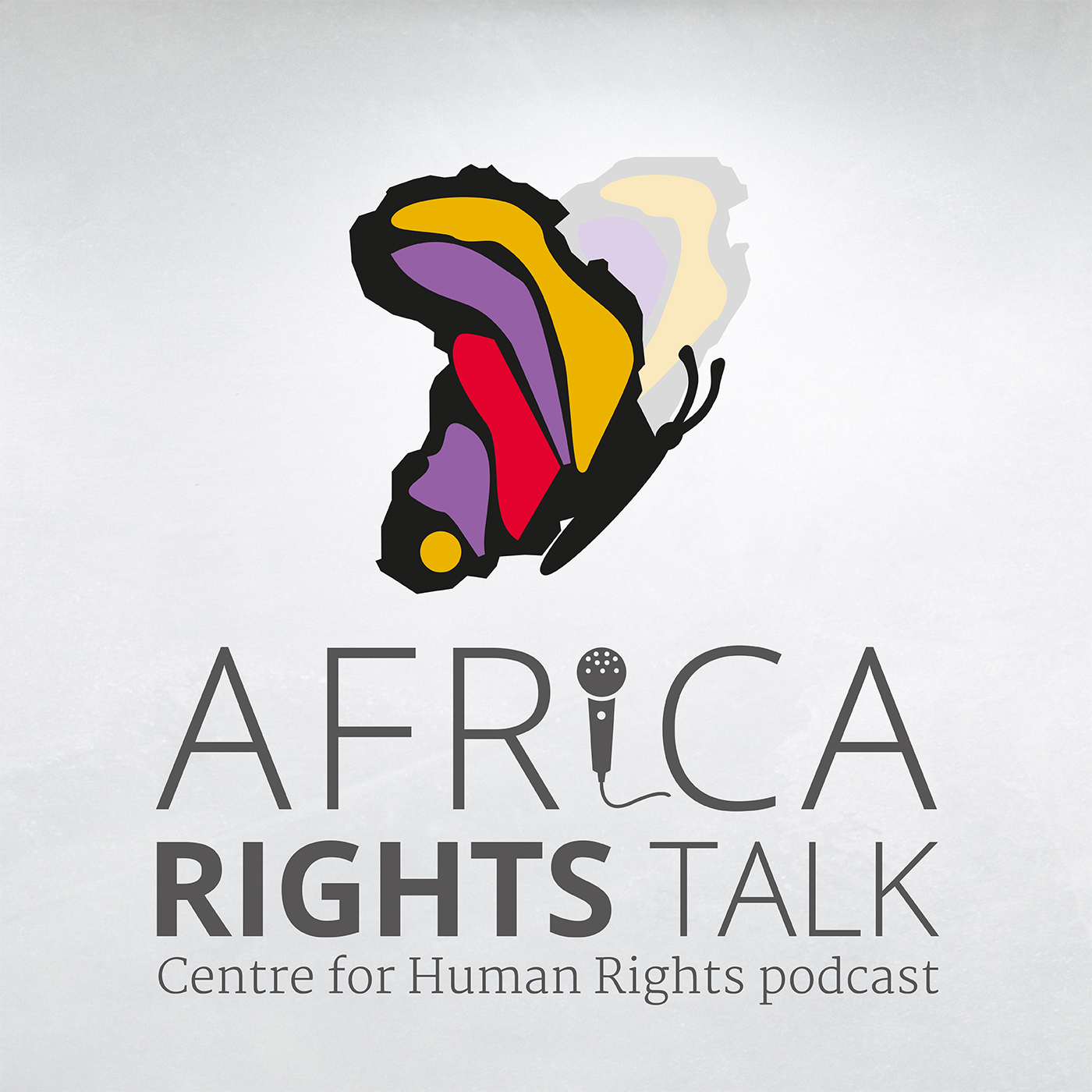Episodes
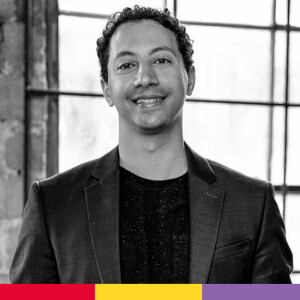
Monday Jun 26, 2023
Monday Jun 26, 2023
In conversation with Andrew Leon Hanna
In this episode, Andrew Leon Hanna, a first-generation Egyptian-American lawyer, social entrepreneur, and author, provides captivating insights into his groundbreaking book, "25 Million Sparks: The Untold Story of Refugee Entrepreneurs." Mr Hanna delves into the remarkable journeys of three women refugee entrepreneurs, challenging stereotypes and advocating for inclusive policies, governance, and the crucial role of storytelling. Mr Hanna emphasises the unique challenges women refugees encounter and their extraordinary contributions to society. Through their stories, "25 Million Sparks" seeks to amplify their voices, dispel harmful stereotypes, and foster a greater appreciation for their resilience, strength, and entrepreneurial spirit. Andrew inspires readers to shift their perspectives and actively support the socioeconomic development of refugee communities. Ultimately, Mr Hanna calls for a more compassionate and equitable world, where the potential of refugee entrepreneurs is recognised, celebrated, and supported.
Andrew Leon Hanna is Andrew Leon Hanna is an American lawyer, entrepreneur, author, and international human rights advocate. He was born to immigrants parents from Egypt. In 2018, he was awarded Financial Times and McKinsey Bracken Bower Prize for his book "25 Million Sparks: The Untold Story of Refugee Entrepreneurs". He is also the founder of DreamxAmerica, Immigrant Love, and Sawa Impact Labs at Stanford and Harvard Universities.
"25 Million Sparks: The Untold Story of Refugee Entrepreneurs" centres on the narratives of three women refugee entrepreneurs, Yasmina, a wedding shop and salon owner creating moments of celebration; Malak, a young artist infusing color and beauty throughout the camp; and Asma, a social entrepreneur who uplifted the Za’atari refugee camp and of the global refugee entrepreneurship phenomenon they represent. The book captures a phenomenon that happens in almost all of the camps: Amid the noisome and sometimes terrible conditions, people begin to regrow their lives by starting tiny businesses. The book is a powerful story of hope and a beautiful reminder of our equal dignity, common humanity, and brilliant potential for innovation. It sheds light on the brutal injustices of war and violence while celebrating refugees’ records of uplifting communities, generating transformative ideas, and creating peace even amid disaster.
For more about 25 Million Sparks:
This conversation was recorded on 19 June 2023.
Music and news extracts: Inner Peace by Mike Chino https://soundcloud.com/mike-chinoCreative Commons — Attribution-ShareAlike 3.0 Unported — CC BY-SA 3.0 http://creativecommons.org/licenses/b...Music promoted by Audio Library https://youtu.be/0nI6qJeqFcc limitless https://stock.adobe.com/za/search/audio?k=452592386
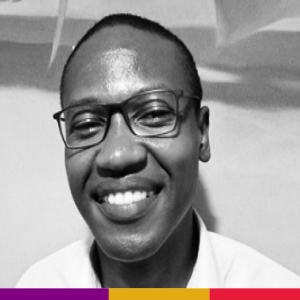
Friday Jun 16, 2023
S5 E2: Youth Day 2023
Friday Jun 16, 2023
Friday Jun 16, 2023
In conversation with Professor Charles Maimela
Youth Day commemorates the Soweto Uprising of 1976. On June 16, 1976, thousands of black students in Soweto took to the streets to protest against the apartheid government’s decision to impose Afrikaans as the medium of instruction in schools. The police responded with violence and many students were killed or injured. The day is now remembered as a symbol of the youth’s resistance against apartheid and their fight for freedom and equality. This year’s Youth Day theme was “Working together for youth development and a drug-free South Africa”.
On this episode, Africa Rights Talk speaks to Prof. Charles Maimela, Deputy Dean, Faculty of Law, University of Pretoria. Prof Maimela discusses the history of Youth day, the significance of its celebration in remembering the sacrifices of the youth of the 1976 Soweto Uprising for the youth of today. He emphasises the importance of youth participation in all spheres of society to facilitate their development and success in society.
Professor Charles Maimela is the youngest and the first black Deputy Dean of the Faculty of Law at the University of Pretoria. He completed his LLB, LLM and LLD degrees through the University of South Africa. He joined the Department of Private Law in 2016 and held teaching positions at University of South Africa and University of KwaZulu-Natal before joining the University of Pretoria. Previously he was coordinating the BA (Law) programme in the Faculty of Law and was also the Editor-in-Chief of De Jure Law Journal. His area of expertise lies in Medical Law; African Customary law and Religion and Law. He has published extensively in his area (s) of research and produced a monograph titled Law and Religion in South Africa in 2019. Recently, he is the editor and contributor of the book “Technological Innovation (4IR) in Law Teaching and Learning: Enhancement or Drawback During Covid-19” 2022. The book argues that law teaching and learning using technological innovations have been positive for both academics and students during the pandemic and maps a way forward for teaching and learning post the pandemic. See link to book: https://www.pulp.up.ac.za/edited-collections/technological-innovation-4ir-in-law-teaching-and-learning-enhancement-or-drawback-during-covid-19
This conversation was recorded on 24 May 2023.
Music and news extracts: Inner Peace by Mike Chino https://soundcloud.com/mike-chinoCreative Commons — Attribution-ShareAlike 3.0 Unported — CC BY-SA 3.0 http://creativecommons.org/licenses/b...Music promoted by Audio Library https://youtu.be/0nI6qJeqFcc limitless https://stock.adobe.com/za/search/audio?k=452592386
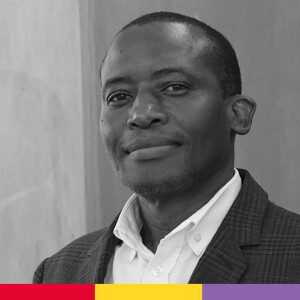
Thursday May 25, 2023
S4 E13: Africa Day 2023
Thursday May 25, 2023
Thursday May 25, 2023
In conversation with Mr Lloyd Kuveya
Africa Day is celebrated annually on May 25th to commemorate the founding of the Organisation of African Unity (OAU), now the African Union (AU) created on May 25th, 1963. Today marks the 60th anniversary of the OAU-AU and the day is intended to celebrate and acknowledge the successes of the African Union in the fight against colonialism and apartheid, as well as the progress that Africa has made while reflecting upon the common challenges that the continent faces in a global environment. Celebrations on May 25th recite the annual commemorations of Africa’s independence, freedom and liberation.
On this episode, in celebration of Africa Day 2023, Africa Rights Talk chats with Mr Lloyd Kuveya on the significance of Africa Day for unity, peace, security, and development in Africa. He highlights that Africa Day is a day to celebrate the principles of African unity, the evolution of the principles of the African Union and the key achievements of the African Union. He iterates that the African Union provides mechanisms such as African Peer Review Mechanism (APRM), the Pan-African Parliament (PAP) as well as the African Commission on Human and Peoples' Rights (ACHPR) to resolve conflicts and bring states together to hold each other accountable on human rights protection and adherence to the rule of law. He expresses excitement for the acceleration of economic unity and integration through the Acceleration of African Continental Free Trade Area (AfCFTA) implementation, a theme for this year's celebration to promote intra-Africa trade, investments and accessible borders to the African people towards the achievement of Agenda 2063.
Lloyd Kuveya is the Assistant Director at the Centre for Human Rights, at the University of Pretoria. He obtained his LLB from the University of Zimbabwe and LLM in Human Rights and Democratisation in Africa from the University of Pretoria. Mr Kuveya is an avid human rights advocate with research interests in international law, human rights law, rule of law, litigation and advocacy. He was the Executive Director of the Zimbabwe Human Rights NGO Forum from October 2015 to May 2017. Before taking up his position at the Centre, Lloyd was Regional Researcher and Advocacy Manager with Amnesty International. Also, he was the Senior Legal Advisor for the International Commission of Jurists from 2013-2015 and Regional Advocacy Manager for the Southern Africa Litigation Centre from 2007-2013. Mr Kuveya is passionate about advocacy for human rights in Africa and developing human rights mechanisms for human rights promotion and protection in Africa.
Watch this episode on our Youtube channel.
This conversation was recorded on 22 May 2023.
Music and news extracts: Inner Peace by Mike Chino https://soundcloud.com/mike-chinoCreative Commons — Attribution-ShareAlike 3.0 Unported — CC BY-SA 3.0 http://creativecommons.org/licenses/b...Music promoted by Audio Library https://youtu.be/0nI6qJeqFcc limitless https://stock.adobe.com/za/search/audio?k=452592386
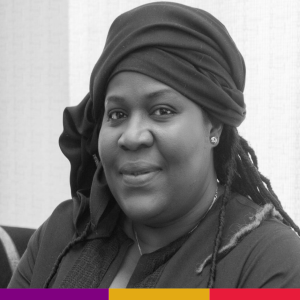
Friday May 19, 2023
Friday May 19, 2023
In conversation with Fatou Jagne Senghore
On 4 May 2023, the Expression, Information & Digital Rights (EIDR) Unit conducted a spotlight interview on the Africa Rights Talk Podcast featuring Ms Fatou Jagne Senghore. The conversation is part of the Centre for Human Rights’ commemoration of the 10 Years of the Model Law on Access to Information for Africa. This podcast episode was moderated by the EIDR clinic students from the LLM/MPhil in Human Rights and Democratisation in Africa programme.
Ms Jagne introduced the current regional framework that provides normative guidance on the exercise of the right of access to information in Africa. She stated that the Model Law on Access to Information for Africa, the 2019 Declaration of Principles on Freedom of Expression and Access to Information in Africa and the Guidelines on Access to Information and Elections in Africa are of great value to African States and emphasised the adoption and implementation of standards encapsulated in these instruments. Ms Jagne further addressed some of the challenges such as bureaucracies, resource constraints, existing laws on secrecy, and technological constraints that hinder access to information in Africa. However, she indicated that there are some notable positive steps towards implementing access to information frameworks at national level. For instance, she noted that The Gambia recently enacted the Access to Information Act, 2021 and anticipates utilising institutional mechanisms to implement the Act. In her conclusion, she underscored the importance of the media and civil society and implored these stakeholders to continue promoting the right to access information.
Fatou Jagne Senghore is a Gambian human rights advocate with over 20 years of experience in the non-profit sector. She founded Article 19 West Africa office in Senegal in 2010 after joining the organisation in 2002 as an Africa Programme Officer. She holds an LLM in Economic and Communication Law, a Master’s degree in International and European Law, and a Bachelor of Law (Civil Law) from the University of Toulouse. She also holds a Bachelor of English Language / Specialty Law and a degree in international relations and development studies. She led Article 19’s work with the African Commission on Human and Peoples’ Rights (ACHPR) on access to information and Freedom of Expression, including the establishment of the mechanism of the Special Rapporteur on Freedom of Expression in Africa in 2004 and the development of normative standards. She has received many distinctions for her human rights work. These include the French National Order of Merit (Chevalier dans l’Ordre National du Mérite) in 2018, the Shield Award for West Africa by the Pan-African Human Rights Defenders Network in 2019, the Press Freedom Hero Award by the Gambia Press Union in 2020, the Deyda Hydara Award in 2021 and Legacy in Activism Award by SheAwards Gambia in 2023. She was included in the Avance Media’ Inaugural List of 100 Most Influential African Women in 2019. She recently founded Center for Women’s Rights and Leadership (CWRL), a platform to advance women’s rights, political participation, and leadership in the Gambia. She is part of the 2023 Amujae Leader Cohort at the Ellen Johnson Sirleaf Presidential Center for Women and Development.
This conversation was recorded on 4 May 2023.
Music and news extracts: Inner Peace by Mike Chino https://soundcloud.com/mike-chinoCreative Commons — Attribution-ShareAlike 3.0 Unported — CC BY-SA 3.0 http://creativecommons.org/licenses/b...Music promoted by Audio Library https://youtu.be/0nI6qJeqFcc limitless https://stock.adobe.com/za/search/audio?k=452592386
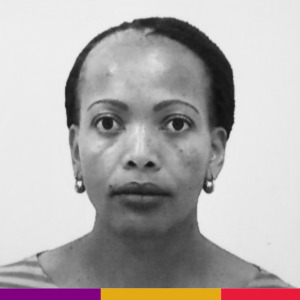
Monday May 15, 2023
Monday May 15, 2023
In conversation with Bokang Lethunya- Khutlang and Ompha Tshamano
In 2022, the Centre for Human Rights, University of Pretoria undertook a research and advocacy project that sought to assess the status of digital rights in Southern Africa. As part of the research component, a report titled The Digital Rights Landscape in Southern Africa. The report came into being after the COVID-19 pandemic exposed the digital gaps and inequalities in Southern Africa.
On this episode, Africa Rights Talk together with Ms. Bokang Lethunya-Khutlang and Mr Ompha Tshamano, discusses the digital rights landscape in Southern Africa with a specific focus on the status of digital rights in Lesotho. The discussion was premised on the challenges that vulnerable communities, namely women, children and people living with disabilities face in realising digital rights in Lesotho. In line with the mandates that States ought to adopt as recommended in the Declaration of Principles on Freedom of Expression and Access to Information in Africa, the discussants reflected on the measures that have been adopted through the Ministry of Justice in Lesotho to ensure that human rights are protected online and offline. In this conversation, Ms Lethunya-Khutlang acknowledged the impact that race, class and gender has on people realising digital rights in Lesotho and subsequently the challenges and stifled opportunities that people face when it comes to accessing digital services and technologies in Lesotho. In conclusion, Ms Lethunya-Khutlang emphasised on the importance of individual and communal efforts in order to ensure a healthy digital life.
Ms. Bokang Lethunya-Khutlang works as a Legal Officer in the Human Rights Unit under the Ministry of Justice and Law, having joined the Unit in June 2008. Her duties entail dissemination of human rights to the public through various media spots; receiving complaints on human rights violations for referral to where they could best be resolved; compilation of human rights state party reports. In a nutshell, her duties are on promotion, protection and monitoring of human rights in Lesotho. Since joining the Unit, Ms. Lethunya-Khutlang has benefitted from several trainings by the OHCHR, UNAIDS, University of Pretoria amongst others. She serves as a coordinator and secretariat of all human rights state party reports and thus has played a key role in compilation of several state party reports both to the UN treaty bodies and the African commission. These include CEDAW, CMW, ICCPR, UPR, ACHPR and Maputo Protocol. Prior to joining the Unit, Ms. Lethunya-Khutlang worked as a Magistrate from 2004 - 2008. She has also served as a Board Director (2015 – 2018) for the Lesotho Communication Authority which is a regulator for the communications sector in Lesotho.
Mr Ompha Tshamano is an LLM Candidate at the University of Pretoria and a project assistant at the Expression, Information and Digital Rights Unit at the Centre for Human Rights, University of Pretoria.
This conversation was recorded on 02 May 2023.
Music and news extracts: Inner Peace by Mike Chino https://soundcloud.com/mike-chinoCreative Commons — Attribution-ShareAlike 3.0 Unported — CC BY-SA 3.0 http://creativecommons.org/licenses/b...Music promoted by Audio Library https://youtu.be/0nI6qJeqFcc limitless https://stock.adobe.com/za/search/audio?k=452592386
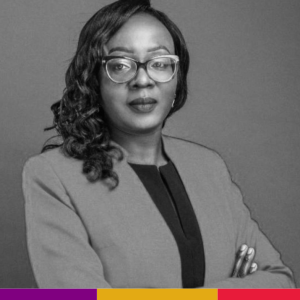
Tuesday May 02, 2023
Tuesday May 02, 2023
In conversation with Viola Ochola
Every year, students at the Centre for Human Rights, University of Pretoria on the LLM/MPhil programme in Human Rights and Democratisation in Africa (HRDA) are assigned to human rights clinics which contribute to the work of the Centre’s research units and give the students practical experience and advance the Centre’s mission towards the realisation of human rights in Africa.
On 25 April 2023, the Centre for Human Rights’ Expression, Information and Digital Rights Unit (EIDR) hosted the Office of the Commission on Administrative Justice (Ombudsman) of the Republic of Kenya in its podcast series Africa Rights Talk commemorating 10 Years of the Model Law on Access to Information in Africa. The episode featured Ms. Viola Ochola as the guest speaker and Chrispin Bosire, Smith Naseri Edumebong and Idirashe Amanda Chikomba, from the EIDR clinic as moderators.
This episode focused on steps that have been taken towards effective implementation of the Kenyan access to information framework as guided by the Model Law on Access to Information for Africa framework developed in 2013 by the African Commission on Human and Peoples’ Rights. This framework seeks to provide legislation guidance to member states of the African Charter on Human and Peoples’ on the implementation of article 9 of the African Charter which provides for the right of access to information. Ms. Ochola indicated that Kenyan representatives actively participated in the deliberations that led to the development of the Model Law and subsequent to its adoption, there is reliance on the Model Law in the implementation of the Kenyan framework.
Ms. Ochola reiterated that the CAJ has also made strides in ensuring adequate access to information by introducing the 2022 Guidelines on Access to Information to ensure availability of information on elections to the citizens of Kenya in the 2022 elections and that the CAJ is undertaking advocacy measures and awareness raising exercises to ensure access to information to everyone including marginalised groups.
Ms. Viola Ochola is the Director of the Office of the Commission on Administrative Justice (CAJ). She is a lawyer, an advocate of the High Court of Kenya and a legal practitioner with administrative law, commercial law, human rights, and law reforms experience spanning over 15 years. She holds an MBA in Strategic Management and has extensive experience both in the public and private sector. She is the immediate former Manager in the Complaints, Investigation and Legal Services Department at the Commission on Administrative Justice. Ms. Ochola is an Open Governmental Leadership Fellow and a member of the Technical Committee on Open Government Partnership (Kenya Chapter) in her capacity as the Cluster Lead for the Access to Information Commitment.
The conversation was recorded on 25 April 2023.
Music and news extracts: Inner Peace by Mike Chino https://soundcloud.com/mike-chinoCreative Commons — Attribution-ShareAlike 3.0 Unported — CC BY-SA 3.0 http://creativecommons.org/licenses/b...Music promoted by Audio Library https://youtu.be/0nI6qJeqFcc limitless https://stock.adobe.com/za/search/audio?k=452592386
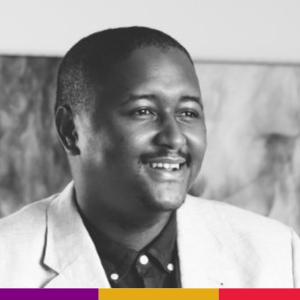
Thursday Apr 27, 2023
S4 E9: 2023 Freedom Day
Thursday Apr 27, 2023
Thursday Apr 27, 2023
In conversation with Professor Joel Modiri
Freedom Day is the commemoration of the first democratic elections held in South Africa on 27 April 1994. These were the first post-apartheid national elections to be held in South Africa, where anyone could vote regardless of race. This day reminds South Africans of the incalculable sacrifices made by individuals and nations in order to liberate them from the chains of discriminatory segregation imposed by the pre-1994 apartheid government. It also reminds South Africans of their national icons, the values they represent and the need to continue to fight for actual freedom and equality in South Africa.
We spoke to Prof Joel Modiri, on this episode of Africa Rights Talk, who reiterates these reflections. Prof Modiri discusses the importance of understanding what freedom means, the importance of history as an ongoing accumulation of the human experience, the need for South Africa to reconcile herself with her past and be in good relations with her history to be able to determine the future of her freedom. He describes Freedom Day as a day for honouring the liberation struggle as well as its failures and understanding the possibilities for freedom today.
Professor Modiri is an Associate Professor and Head of the Department of Jurisprudence at the University of Pretoria. He holds degrees LLB cum laude (Pret) and PhD (Pret). His PhD thesis was entitled “The Jurisprudence of Steve Biko: A Study in Race, Law and Power in the ‘Afterlife' of Colonial-apartheid”. He mainly teaches in the field of Jurisprudence and Legal Philosophy. He has convened and taught a number of law subjects such as Social Justice and Human Rights, African Human Rights, Research Methodology, Legal Problems of HIV & AIDS, and Law and Transformation. He has also taught portions of courses in Political Science, Sociology and Public Policy presented by the Faculty of Humanities at the University of Pretoria. He currently convenes the LLM/MPhil in Post-apartheid jurisprudence. He has over 20 publications in academic journals under his name and has edited books and delivered lectures internationally and nationally. Prof Modiri has previously been on an episode of Africa Rights Talk titled “Institutional racism and how it manifests in the African context”. To listen to his previous conversation on Africa Rights Talk, follow the ink: https://www.up.ac.za/faculty-of-law/news/post_2916503-africa-rights-talk-season-2-episode-9-joel-modiri
The conversation was recorded on 19 April 2023.
Do not forget to follow our Twitter page.
Music and news extracts: Inner Peace by Mike Chino https://soundcloud.com/mike-chinoCreative Commons — Attribution-ShareAlike 3.0 Unported — CC BY-SA 3.0 http://creativecommons.org/licenses/b...Music promoted by Audio Library https://youtu.be/0nI6qJeqFcc
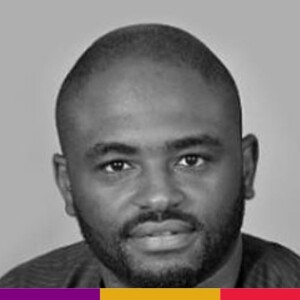
Tuesday Apr 25, 2023
S4 E8: The dynamics of the African Union reform process
Tuesday Apr 25, 2023
Tuesday Apr 25, 2023
In conversation with Professor Babatunde Fagbayibo
The Centre for Human Rights, in partnership with Ghent University, presented its annual Advanced Human Rights Short Course (AHRC) on the African Human Rights System in Comparative Perspectives from 17 to 21 April 2023. In this episode, in light of this short course, Professor Babatunde Fagbayibo walks us through the dynamics of the African Union reform process and its implications for achieving supra nationalism in Africa. He highlights the key challenges and opportunities of this reform process and stresses the importance of an effective Continental Free Trade Area on vast economic change on the continent.
Professor Babatunde Fagbayibo is a Professor of International Law at the University of Pretoria. He holds an LLB degree from the University of South Africa (Unisa). His LLM and LLD degrees were obtained from the University of Pretoria. His doctoral thesis explored the politico-legal feasibility of endowing the African Union with supranational competences. Other research interests include African politics, transnational policy analysis, critical approaches to international law, and governance and democratisation in Africa. He has written widely on these topics. He also provides commentary in print and broadcast media on African affairs of democratisation and constitutional governance. In 2022, Professor Fagbayibo released a book titled ‘Transcending member states: political and legal dynamics of building continental supranationalism in Africa’.
Youtube link: https://www.youtube.com/watch?v=QvFVmc7Rd-g
This conversation was recorded on 17 April 2023.
Music: Inner Peace by Mike Chino https://soundcloud.com/mike-chinoCreative Commons — Attribution
ShareAlike 3.0 Unported — CC BY-SA 3.0 http://creativecommons.org/licenses/b...Music promoted by Audio Library https://youtu.be/0nI6qJeqFcc
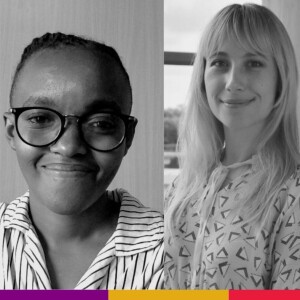
Friday Apr 21, 2023
Friday Apr 21, 2023
In conversation with Lizzy Muthoni Kibira and Chanel van der Linde
On 24 February 2023, the Kenyan Supreme Court ruled that the National Gay and Lesbian Human Rights Commission (NGLHRC) must be allowed to officially register as a non-governmental organisation (NGO). The Supreme court held that it would be unconstitutional to limit the right to associate through denial of registration. This ruling ends a decade-long legal case. In this episode, Africa Rights Talk in conversation with Lizzy Muthoni Kibira and Chanel van der Linde discuss this triumph for justice and human rights in Kenya and the future of LGBTI Rights in Africa.
Lizzy Muthoni Kibira is a Kenyan lawyer and researcher based in Nakuru, Kenya. She previously worked with Strathmore University School of Law and Kabarak University School of Law. Ms. Kibira holds an LLB from Strathmore University, Kenya. Her academic interests include public life of law, history and politics; and the function of international organisations. She published an article in the Strathmore Law Journal, titled, A Representative of the People, A review of Dominic Burbidge’s An Experiment in Devolution: National Unity and the Deconstruction of the Kenyan State. Her current project focuses on the public life of the commonwealth organisation. Link to her publication: https://heinonline.org/HOL/LandingPage?handle=hein.journals/strathlj5&div=12&id=&page=
Chanel van der Linde is a project officer at the Sexual Orientation, Gender Identity and Expression, and Sexual Characteristic (SOGIESC) Unit, at the Centre for Human Rights, University of Pretoria. She holds an LLB from the University of Witwatersrand and an LLM in Multidisciplinary Human Rights from the University of Pretoria.
This conversation was recorded on 16 and 17 March 2023.
Instagram: africarightstalk Twitter: artrightstalk YouTube: www.youtube.com/africarightstalk Africa Rights Talk
Music: Inner Peace by Mike Chino https://soundcloud.com/mike-chinoCreative Commons — Attribution-ShareAlike 3.0 Unported — CC BY-SA 3.0 http://creativecommons.org/licenses/b...Music promoted by Audio
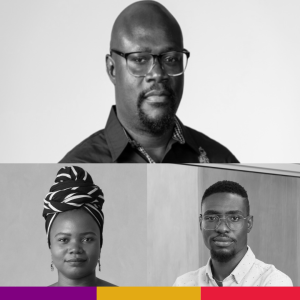
Sunday Apr 16, 2023
S4 E6:The Nigerian 2023 Elections, a human rights lens
Sunday Apr 16, 2023
Sunday Apr 16, 2023
In conversation with Professor Christopher Isike, Janet Gbam and Foluso Adegalu
On February 25 2023, the Nigerian presidential elections were held. Nigerian voters came out in their numbers to cast their ballots to select the next president after outgoing President Muhammadu Buhari stepped down. This was against a political background of mounting unhappiness and widespread unrest, insecurity and economic hardship, such as the inability to access cash, high inflation, deadly attacks by gunmen against civilians. While the elections were initially marked by a high voter turnout and mainly peaceful voting, they were marred reports of vote buying, voter intimidation, attacks on polling units in certain areas, and unpunctual electoral officials along with accusations of outright fraud to compound issues with trust in the election. Independent National Electoral Commission (INEC) also failed to upload polling unit results to the INEC result viewing portal as previously assured would happen on election day. It is light of these circumstances, along with statements critical of INEC from observers and civil society groups that have inspired this conversation. This episode analyses the developments of these elections from a human rights lens.
Professionally, Ms Janet Uosu Gbam is an international human rights lawyer and Doctoral Candidate from the Centre for Human Rights, University of Pretoria. Over the last ten years, she has successfully worked with teams to promote and protect human rights by initiating, managing, and executing humanitarian, and human rights programs touching on racial, ethnic, gender, and socio-economic issues for notable human rights organisations. She also has experience working with international NGOs in West Africa, Southern Africa and the United States.
We spoke to Foluso Adegalu, a Doctoral Researcher and Programme Manager for the Litigation and Implementation Unit at the Centre for Human Rights, University of Pretoria. His research interest in international human rights law focuses on improving the efficacy of international human rights standards and monitoring mechanisms. Foluso’s human rights practice includes the strategic use of the law particularly through judicial and quasi-judicial institutions to enforce human rights, prevent human rights violations, and seek redress for victims of human rights violations. He is a Barrister and Solicitor of the Supreme Court of Nigeria with over ten years of experience in legal practice.
Christopher Isike, PhD, is a Professor of African Politics and International Relations in the Department of Political Sciences, University of Pretoria and Director of the African Centre for the Study of the United States, University of Pretoria (ACSUS-UP), South Africa. He is also the current President of the African Association of Political Science (AAPS), and member of the Board of Directors of Global Development Network (GDN). Professor Isike conducts research from an Africanist lens, and teaches international relations theory, strategic and security studies, and security theory at the University of Pretoria. His research interests include African soft power politics, women, peace and conflict studies, women and political representation in Africa, rethinking state formation in Africa, politics in a digital era and African immigration to South Africa. A C2 rated researcher by the National Research Foundation, Professor Isike has over 70 publications in top national and international peer-reviewed journals including chapters in books published by reputable publishing houses globally. He is Editor-in-Chief of Africa’s foremost political science journal, Politikon: South African Journal of Political Studies (2020 to 2024), and has been Editor of Ubuntu: Journal of Conflict and Social Transformation since 2017. He also serves on the editorial board of several reputable international journals, such as International Political Science Abstracts, Canadian Journal of African Studies, African Journal of Political Science and Strategic Review for Southern Africa. Professor Isike consults for United Nations Population Fund (UNPF), United Nations International Children's Emergency Fund (UNICEF), United Nations Entity for Gender Equality and the Empowerment of Women (UN Women) and the KwaZulu-Natal Provincial Government on gender equality and women empowerment issues in South Africa. He is a Social Cohesion Advocate of South Africa appointed by the Minister of Sports, Arts and Culture (2020 – 2024).
Please note that, while great care and thorough efforts to provide accurate information through research and in the recording of this episode have been taken, Africa Rights Talk acknowledges that the developments of the 2023 Nigerian elections are still ongoing. We will be monitoring the situation, and produce another episode in light of the new developments that may arise.
This conversation was recorded between 3 March and 7 March 2023
Research by Victoria Amaechi (she/they)
Instagram: africarightstalk Twitter: artrightstalk YouTube: Africa Rights Talk
Music and news extracts: Inner Peace by Mike Chino https://soundcloud.com/mike-chinoCreative Commons — Attribution-ShareAlike 3.0 Unported — CC BY-SA 3.0 http://creativecommons.org/licenses/b...Music promoted by Audio Library https://youtu.be/0nI6qJeqFcc , https://www.dw.com/en/nigerias-youth-mobilized-to-vote-in-upcoming-elections/video-64461579, https://www.euronews.com/2023/02/26/counting-underway-but-it-could-be-days-before-official-election-result-is-announced-in-nig , Alexey Anisimov https://stock.adobe.com/za/search/audio?k=564750551 , limitless https://stock.adobe.com/za/search/audio?k=452592386

